16 TypeScript Alternatives Worth Considering
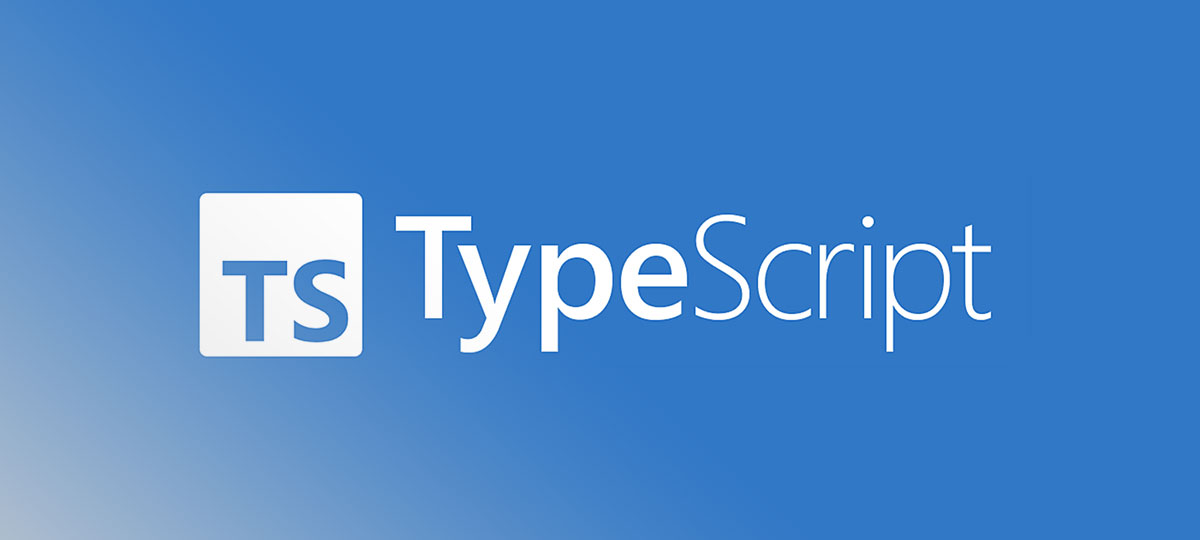
Picture this: You’re crafting a digital masterpiece, your code fluttering across the screen like a symphony.
But then, the discordant note of limitation strikes—it’s TypeScript, and it’s keeping you boxed in. What if the melody could be different? Could there be more freedom, more expression out there?
Enter the realm of TypeScript alternatives, an array of programming languages and tools beckoning with the promise of a new style of composition.
Here, every web artisan wishes for a palette that’s just the right fit for their creative vision. You’re not just a coder; you’re an architect of the digital era, seeking the sturdiest yet most pliable materials for your constructions.
In this piece, we unfold the map to these concealed treasures. By journey’s end, you’ll be versed in navigating the terrain of JavaScript ES6, the hidden alleyways of Dart, and the secretive enclaves where Elm whispers among the tech savants.
With each paragraph, we strip away the veil from alternatives that hold the power to redefine how you sculpt the virtual landscape. Prepare to elevate your coding narrative beyond what you thought possible.
TypeScript alternatives
| TypeScript Alternative | Main Use Case | Language Basis | Interop with JS | Notable Features |
|---|---|---|---|---|
| Kotlin | Web, Server, Mobile | JVM-based, Kotlin | Seamless | Statically typed, null-safe, JVM Interop, multiplatform |
| CoffeeScript | Simplified JS scripting | JavaScript | Direct | Readable syntax, minimalistic |
| Dart | Web, Mobile (Flutter) | C-style | Through JS API | Optimized for UI, sound null safety, ahead-of-time compilation |
| Elm | Functional UI Web Apps | Haskell-inspired | Ports | Pure functional, strong types, no runtime exceptions |
| Scala.js | Web | Scala, JVM-based | Facades | Functional programming, strong types, JVM ecosystem |
| PureScript | Functional Web Apps | Haskell-inspired | FFI (Foreign Function Interface) | Purely functional, strong typing system |
| ReasonML | Web, Native | OCaml | BuckleScript | ML syntax, functional programming, JS-friendly |
| ClojureScript | Web, Server | Clojure, JVM-based | Seamless | Lispy syntax, immutable data structures, functional paradigm |
| Swift | iOS, macOS, Web | Swift | Limited (through WebAssembly) | Statically typed, optionals, protocol-oriented programming |
| Fable | Web | F# | Babel integration | F# syntax, functional-first, strong typing |
| Nim | General-purpose | Nim | Seamless | Python-inspired syntax, metaprogramming, compile to C, C++, JS |
| Lua | Embedded scripting, Web (via LuaJIT) | Lua | Through custom integration | Lightweight, fast, embeddable, LuaJIT performance |
| Haxe | Cross-platform | Haxe | Seamless | Strongly typed, cross-compilation, macros |
| Ceylon | General-purpose | JVM-based | Well-defined interop | Modular architecture, strong typing, declarative UI |
| GopherJS | Web | Go | Through packages | Go syntax, goroutine support, leveraging Go’s stdlib |
| Emscripten | Porting C/C++ to Web | C/C++ | Through generated glue code | Compiles LLVM bytecode to WebAssembly, extensive porting support |
Kotlin
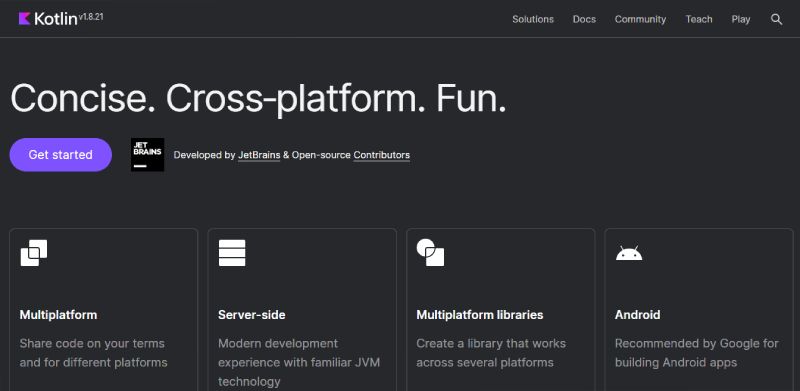
A powerhouse of interoperability, Kotlin offers a sweet spot where functionality collides with brevity. Designed primarily by the folks at JetBrains, it’s got a knack for making complex things simple. Jetting through code on JVM, Android, and even web browsers, Kotlin’s adaptability is nothing short of wondrous.
Best Features:
- Interoperable with Java
- Concise syntax
- Great for Android development
What we like about it: Kotlin’s harmony with Java wins hearts. That smooth compatibility dance means you can integrate with legacy Java code without skipping a beat.
CoffeeScript
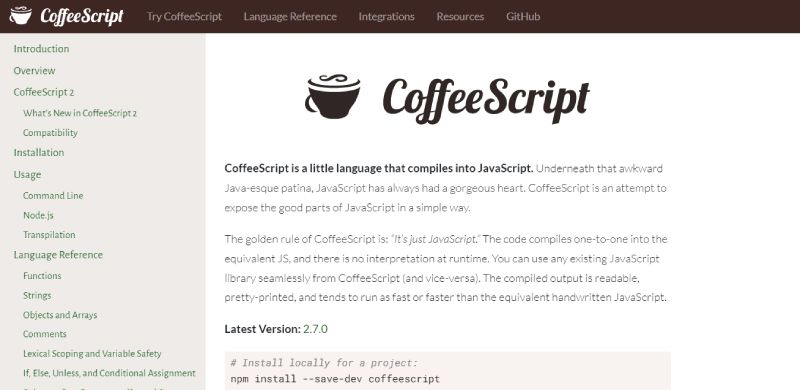
Imagine whipping up JavaScript with a syntax as smooth as your favorite latte. That’s CoffeeScript – giving you the kick of JavaScript with a sprinkle of sugar. Coding becomes more intuitive, and let’s be real, who doesn’t like a cleaner countertop, erm, codebase?
Best Features:
- Readable, succinct syntax
- Avoids the verbosity of JavaScript
- Compiles into JavaScript
What we like about it: CoffeeScript’s cleaner syntax is the barista’s secret – less mess, more flavor, serving up the JavaScript experience minus the clutter.
Dart

Picture this: a balancer, gliding between front-end and back-end with seamless grace. Dart does just that. Developed by Google, it’s the go-go gadget behind the scenes of Flutter, sparking joy with its single codebase philosophy for web, server, and mobile apps.
Best Features:
- Optimized for UI development
- Supports ahead-of-time and just-in-time compilation
- Single codebase for multiple platforms
What we like about it: The way Dart unifies app development, fluttering from to-do list app to super complex systems with Flutter’s support – it’s like having a Swiss Army knife in your digital toolkit.
Elm
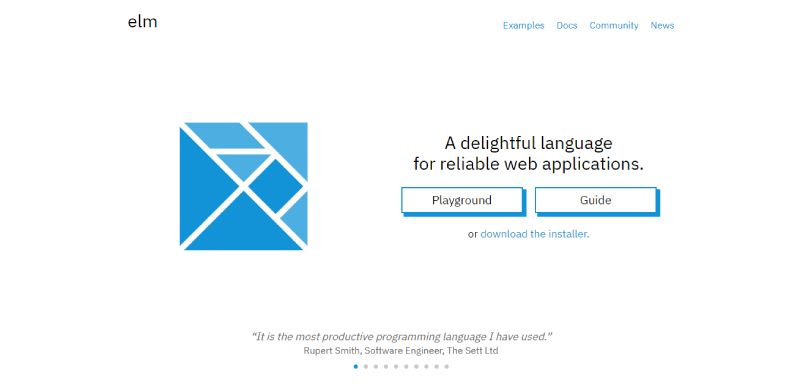
Elm is like that friend who’s always calm – no runtime exceptions up in here, just a serene sea of functional programming that turns web app creation into a streamlined dream. It’s all about the immutability and purity, keeping side-effects at bay and your SPA blooming without a glitch.
Best Features:
- Zero runtime exceptions
- Strong type inference
- Easy to maintain code
What we like about it: Elm’s architecture keeps your web garden so Zen, it’s like coding in a silent retreat with spa music – everything flows, nothing breaks.
Scala.js
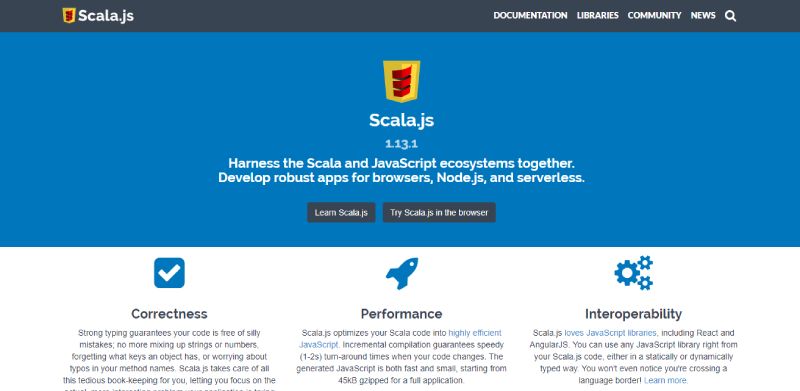
Think of Scala.js as the academic, taking the robustness of Scala to the browser. Dive deep into functional and object-oriented paradigms without forsaking the JavaScript ecosystem. Leveraging the Scala language, this bad boy ensures you get to play with complex types and abstractions neatly in the web playground.
Best Features:
- Advanced type system
- Full interoperability with JavaScript libraries
- Facilitates complex and scalable web applications
What we like about it: Scala.js’ type safety is like a math whiz doing your taxes – everything adds up perfectly, leaving you to more creative endeavors.
PureScript
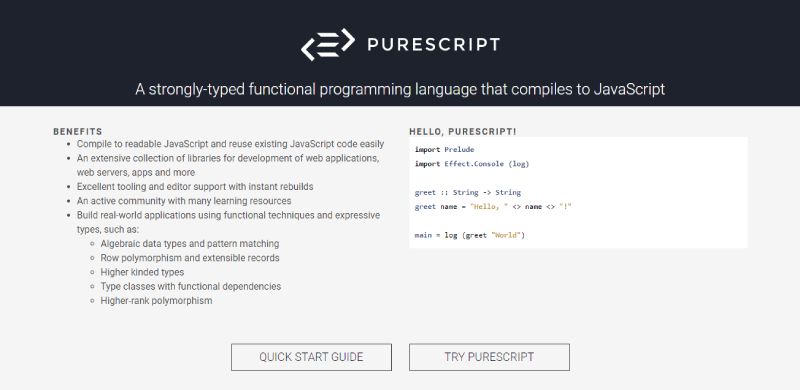
PureScript is like a secret handshake among functional programming enthusiasts, bringing the elegance of Haskell to the web without a curfew. Its strong typing and purity principles make for reliable, maintainable code that’s music to a coder’s ears and less of a headache in the long run.
Best Features:
- Strongly typed
- Functional programming paradigms
- Haskell-like syntax
What we like about it: The crisp Haskell vibes PureScript lets off while spoiler-alerting bugs in that strong typing cape – it’s like preventive medicine for your code.
ReasonML
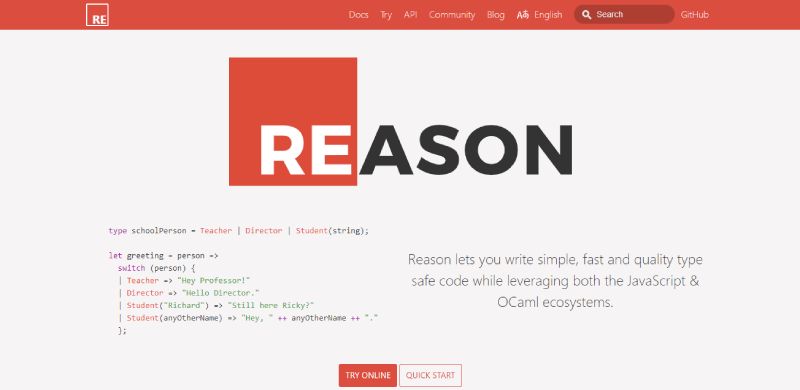
Imagine JavaScript getting a tailored suit, cut to fit like a dream – that’s ReasonML for you. Crafted at Facebook, it blings out JavaScript with a new syntax coat and supercharges it with OCaml’s might. The result? A language that’s reactive, speedy, and feels oh-so-smooth on the frontend.
Best Features:
- JavaScript interoperability
- Fast compilation time
- Powerful type system
What we like about it: ReasonML’s type safety is as trusty as a double-knot – your code’s tied up tight, no tripping.
ClojureScript
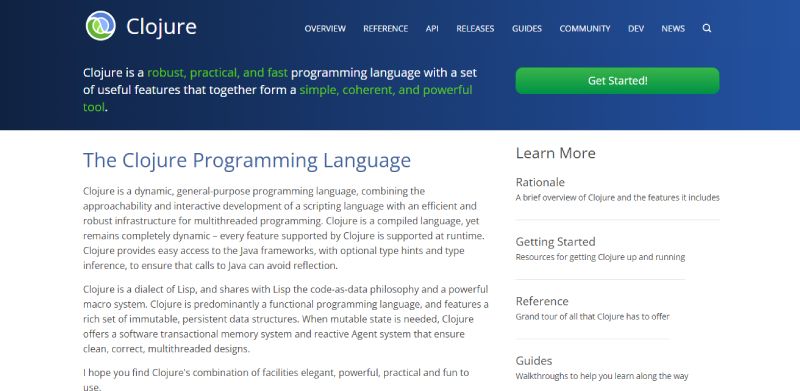
ClojureScript is the spice that turns the everyday JavaScript dish into a gourmet experience. With its roots in Clojure, it shines in its simplicity and functional finesse, blending with existing JavaScript libraries like they’re herbs and seasonings, meant to be together.
Best Features:
- Functional programming with immutable data structures
- Seamless integration with JavaScript libraries
- Robust Clojure ecosystem
What we like about it: The immutable data structures ClojureScript brings to the table. It’s like having a sous chef who preps perfectly, no mistakes.
Swift
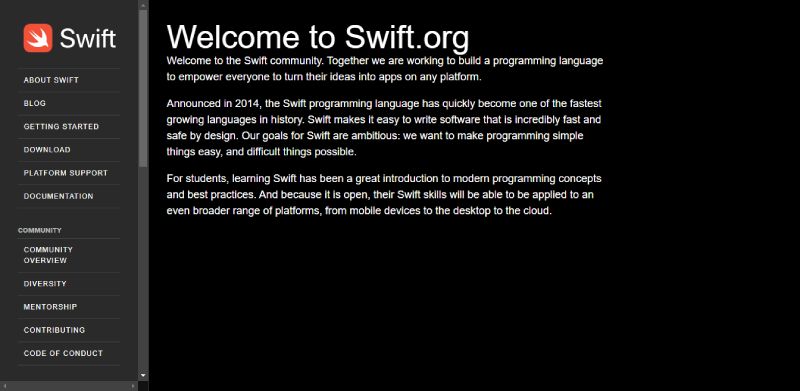
Swift swoops into web land with the same flair it adds to Apple’s platforms – a strong, static typed language that packs a punch. It’s not just for iOS; Swift for WebAssembly is making strides, allowing your code to reach near-native performance in web browsers.
Best Features:
- High performance
- Statically-typed, reducing bugs
- Swift for WebAssembly for web deployment
What we like about it: Swift’s ability to zoom straight to browser-native speed, giving users that smooth, app-like breeze.
Fable
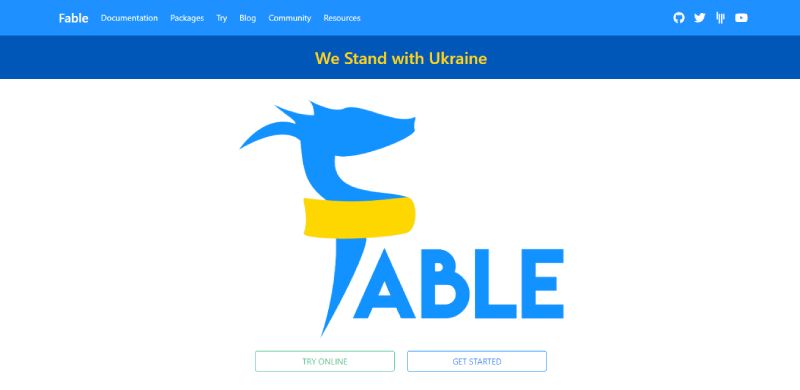
Fable swings from the same branch as Elm, waving the functional programming flag. Yet, it’s distinct with its F# lineage, compiling to JavaScript with a flair that encourages crisp, clean, and safe code, sprinkled with all the .NET ecosystem goodies.
Best Features:
- F# to JavaScript compilation
- Strongly typed functional programming
- Access to the .NET ecosystem
What we like about it: Fable’s pipeline with .NET libraries means dipping into a well of resources deeper than your favorite fantasy trilogy.
Nim
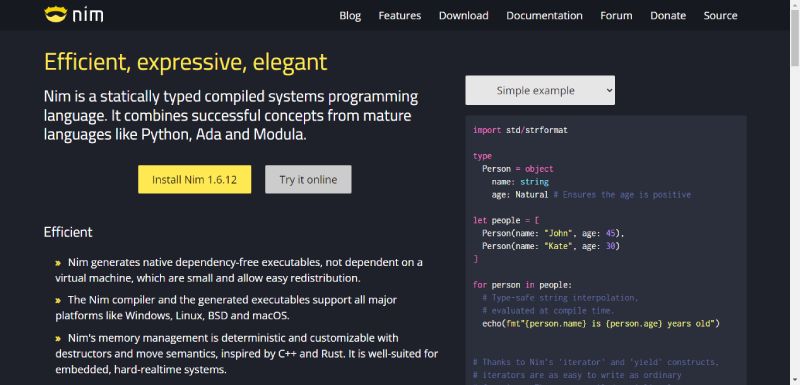
Nim prances onto the scene like a blend of Python’s readability with C’s efficiency and speed. It compiles to C, C++, JavaScript, and more, tailoring to almost every realm of coding. It’s the chameleon in the programming jungle – adaptable and nimble.
Best Features:
- Elegant, Python-like syntax
- Compiles to C/C++, JavaScript, and more
- Efficient performance
What we like about it: The performance boost Nim gives is like strapping a jetpack to your project – it launches.
Lua
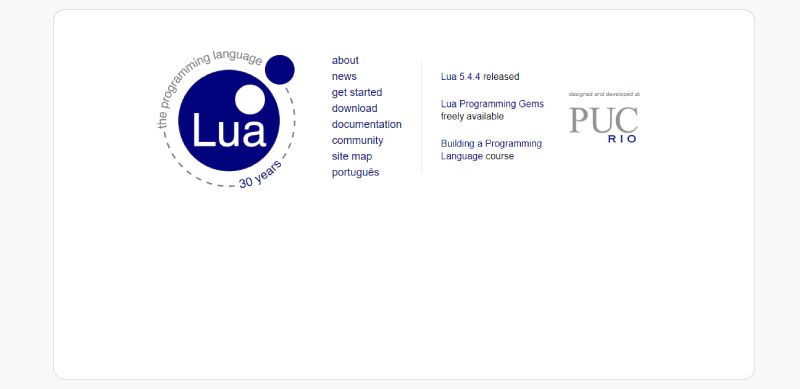
Lua is that lightweight buddy you call when you need to squeeze through tight, performance-crucial spots. Often embedded in games or spotted in scripting, its nimbleness is its charm. And for web? Pair it with WebAssembly, and you’ve got dynamic capabilities brushing shoulders with stellar performance.
Best Features:
- Extremely lightweight
- Embeddable scripting language
- Fast execution
What we like about it: Lua’s speed—it’s like the code’s been shot out of a cannon, landing spot on target, every time.
Haxe
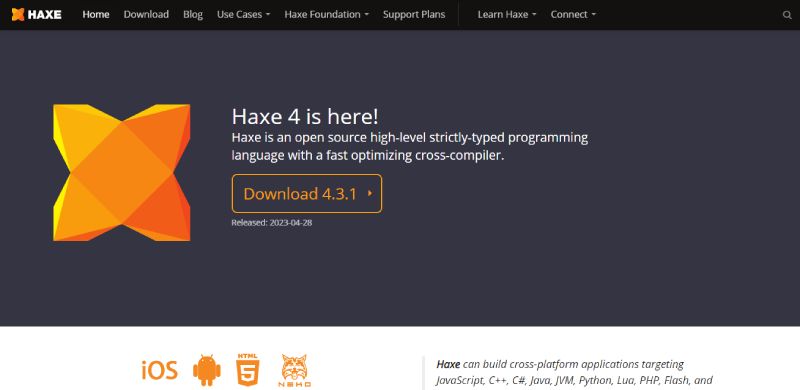
Haxe is like the translator who speaks every language at the UN assembly. Write once, and deploy just about anywhere – whether it’s web, mobile, or desktop. Its diverse target platforms and robust standard library make it a versatile pick for any developer arsenal.
Best Features:
- Cross-platform
- Strongly typed
- Versatile standard library
What we like about it: The cross-platform magic of Haxe – a genuine code polyglot, uniting devices in a harmonious codetopia.
Ceylon
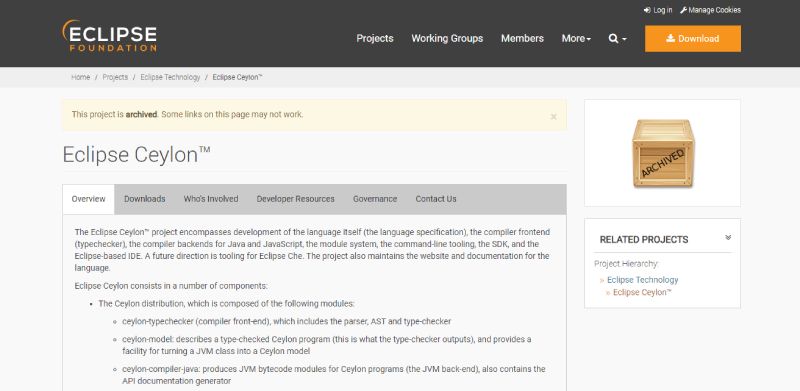
Developed by Red Hat, Ceylon dons a heavy suit of armor with its strong and static typing system. Comfortable on both JVM and JavaScript environments, it pitches a tent where classical meets modern, offering tools and constructs that aim for legibility and predictability.
Best Features:
- Modular architecture
- Strongly typed for JVM and JavaScript
- Union and Intersection types for flexibility
What we like about it: Ceylon’s modular approach – it’s like having custom-made containers for code pieces, classy and snug.
GopherJS
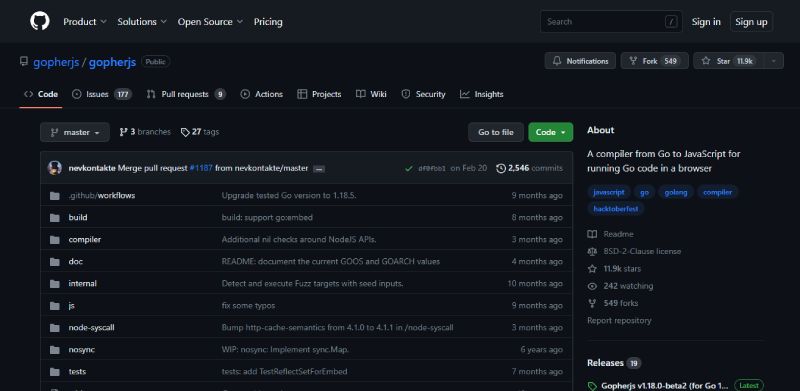
GopherJS grabs Go’s concurrency and simplicity and tosses them straight into the web cauldron. By compiling Go to JavaScript, developers can wield familiar felt-tip Go tools in the vast coloring book of web development with no compromise on productivity.
Best Features:
- Go to JavaScript compilation
- Access to Go’s toolchain and resources
- Synchronous and concurrent design patterns
What we like about it: The concurrency prowess it gets from Go—it’s like having a squad of octopuses juggling tasks, in-sync and efficient.
Emscripten
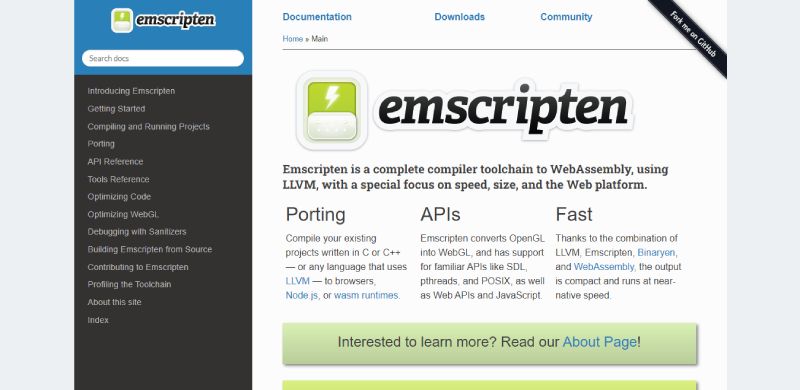
Marching to a different beat, Emscripten summons C and C++ to the web domain. Armed with LLVM bytecode, it transmutes these languages to WebAssembly, letting you run high-performance applications right in your browser, no sweat.
Best Features:
- Compiles C/C++ to WebAssembly
- High-performance web applications
- Extensive porting of existing codebases
What we like about it: Emscripten’s knack for turning heavyweight C/C++ into web-friendly muscle – it’s heavyweight lifting with the grace of ballet.
FAQ on TypeScript alternatives
Why Look Beyond TypeScript?
Let’s cut to the chase: TypeScript’s cool and all, but it’s not the one-size-fits-all for coding projects. Sometimes you want something leaner, or maybe you need a language that’s more flexible for your team’s know-how. It’s like picking the right brush for a canvas—different strokes for different folks.
What Exactly Are TypeScript Alternatives?
When you step outside TypeScript’s garden, you wander into a landscape dotted with dynamic gems like JavaScript ES6, sturdy contenders like Dart, or the sleek and functional Elm. Each brings its own flavor to the table, changing how you tackle the coding feast.
Are These Alternatives as Robust as TypeScript?
In their own right, absolutely. Flow keeps your code river running without a hitch, and Dart? It’s got your back with structure and tools that rival TypeScript’s might. Sure, they’ve got different vibes, but they don’t skimp on substance.
How Steep Is the Learning Curve?
Fret not, learning a new language isn’t an Odyssean ordeal. If you’ve tangoed with TypeScript, picking up JavaScript ES6 might just be like learning a new dance move—it’s familiar. And PureScript? It’s like learning to waltz if you’re into Haskell’s rhythm.
Will My Team Adapt Easily to These Alternatives?
If they’ve jived with TypeScript, it’s like swapping out an instrument in the band—not necessarily harder, just different. Flow’s notation might seem like a familiar tune, while Elm’s functional groove will just be a new rhythm to sway to.
Can I Still Use My Favorite Frameworks With These Alternatives?
Absolutely. Think of frameworks like the stages for your code. Whether Angular’s your jam or you’re all about React’s beat, many TypeScript alternatives can still rock those platforms. Whether it’s Babel out front or another transpiler, your show goes on without missing a beat.
What About Tooling and Community Support?
Communities are alive and kicking, all right. Just cruise over to GitHub or Stack Overflow and you’ll find folks buzzing about PureScript or ReasonML. These gatherings are teeming with insights and tools at the ready, just take a stroll and soak it in.
Is Migrating from TypeScript a Hassle?
Sure, it’s not a walk in the park, but it’s no Herculean task either. Take it step by step—analyzing code, choosing your language, setting up the environment. Transition tools? They’re your moving buddies, making this shift smoother.
Will Choosing an Alternative Impact Performance?
That’s the beauty of it—the right tool can fine-tune the performance! You might discover that Dart adds some extra zip to your applications, or perhaps Elm’s architecture has you marveling at its streamlined elegance. It’s all about the right pick.
Do TypeScript Alternatives Offer Better Type Safety?
Type safety’s their middle name in many cases. Languages like ReasonML are syntax superheroes, offering a refuge for those seeking a stronghold of type security. You’re still shielded, just by a different guard.
Ending thoughts
Alright, we’ve been on quite the journey, haven’t we? Scoutin’ the horizon for those TypeScript alternatives, and hey, we found some solid prospects.
We zigzagged through the ins-and-outs of static typing and how we can weave that into our coding fabric without TypeScript tugging the strings.
We locked eyes with some vibrant choices. Flow took a bow with its static type checking, and Elm waltzed in, boasting a functional programming flair that’s clean and sharp.
Languages like PureScript and tools like Babel just showed us that there’s more than one way to paint a sunset – every hue essential, every brushstroke significant.
So, think of this: as the digital canvas sprawls out in front of ya, know you’ve got an eclectic mix of palettes to pick from. Go on, dip your brush, let these alternatives color your world, and watch as your web creations sing to the tune of variety and choice.
If you liked this article about TypeScript alternatives, you should check out this article about Angular alternatives.
There are also similar articles discussing PHP alternatives, Ruby alternatives, Redux alternatives, and Express alternatives.
And let’s not forget about articles on Spring alternatives, Flask alternatives, Laravel alternatives, and Python alternatives.
- Creating Stunning Visual Effects with Apps Like Adobe After Effects - May 1, 2024
- Managing Multiple Websites from a Single Installation - May 1, 2024
- C++ Capabilities: What is C++ Used For? - May 1, 2024








